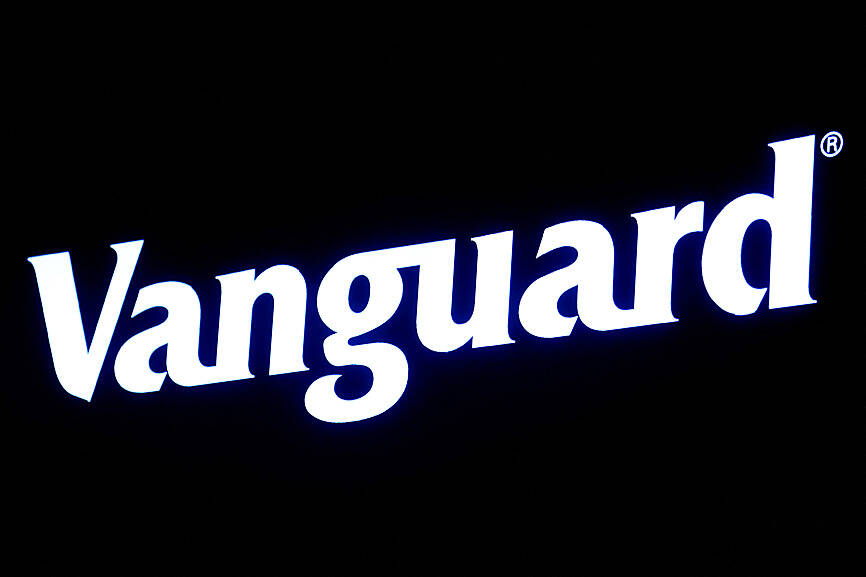Vanguard Group Inc, the US asset-management giant, is to shutter its remaining business in China after a retreat two years ago, people familiar with the matter said, abandoning a 27 trillion yuan (US$3.9 trillion) fund market that global competitors are embracing.
The Malvern, Pennsylvania-based firm has notified the Chinese government of intentions to shutter its unit in Shanghai, the people said, requesting not to be named because the matter is private.
The company also is planning to exit a robo-advisory joint venture with Jack Ma (馬雲)-backed Ant Group Co (螞蟻集團), the people said.

Photo: Reuters
The moves would mark a complete exit from China for the US$7.1 trillion giant, which once saw significant potential in the world’s second-largest economy.
The reversal stands as a cautionary tale for global peers including BlackRock Inc and Fidelity International Ltd, which are still racing to build up local operations as the nation’s recovery and a new pension reform brighten prospects.
Vanguard said that its Shanghai unit and the joint venture are operating normally.
Ant and representatives of the joint venture said the same.
All three declined to comment further.
The Chinese Securities Regulatory Commission did not immediately reply to a request seeking comment.
Caixin reported Vanguard’s plans earlier.
A complete retreat would follow Vanguard’s surprise move two years ago to scrap plans for a mutual-fund management license in China.
Fidelity and Neuberger Berman Group have recently joined Blackrock in launching onshore funds through new wholly owned units, while Manulife Financial Corp, JPMorgan Chase & Co and Morgan Stanley have gained approvals to buy out local partners to gain full control of existing ventures.
The race for fund advisory is heating up with more players coming in, hurting profitability. Vanguard’s venture, which has been offering only products from competitors, booked a loss in 2021 that was much higher than an internal forecast made after it was set up in 2019. Vanguard owns 49 percent of it.

Taiwan’s foreign exchange reserves hit a record high at the end of last month, surpassing the US$600 billion mark for the first time, the central bank said yesterday. Last month, the country’s foreign exchange reserves rose US$5.51 billion from a month earlier to reach US$602.94 billion due to an increase in returns from the central bank’s portfolio management, the movement of other foreign currencies in the portfolio against the US dollar and the bank’s efforts to smooth the volatility of the New Taiwan dollar. Department of Foreign Exchange Director-General Eugene Tsai (蔡炯民)said a rate cut cycle launched by the US Federal Reserve

The US government on Wednesday sanctioned more than two dozen companies in China, Turkey and the United Arab Emirates, including offshoots of a US chip firm, accusing the businesses of providing illicit support to Iran’s military or proxies. The US Department of Commerce included two subsidiaries of US-based chip distributor Arrow Electronics Inc (艾睿電子) on its so-called entity list published on the federal register for facilitating purchases by Iran’s proxies of US tech. Arrow spokesman John Hourigan said that the subsidiaries have been operating in full compliance with US export control regulations and his company is discussing with the US Bureau of

Businesses across the global semiconductor supply chain are bracing themselves for disruptions from an escalating trade war, after China imposed curbs on rare earth mineral exports and the US responded with additional tariffs and restrictions on software sales to the Asian nation. China’s restrictions, the most targeted move yet to limit supplies of rare earth materials, represent the first major attempt by Beijing to exercise long-arm jurisdiction over foreign companies to target the semiconductor industry, threatening to stall the chips powering the artificial intelligence (AI) boom. They prompted US President Donald Trump on Friday to announce that he would impose an additional

Pegatron Corp (和碩), a key assembler of Apple Inc’s iPhones, on Thursday reported a 12.3 percent year-on-year decline in revenue for last quarter to NT$257.86 billion (US$8.44 billion), but it expects revenue to improve in the second half on traditional holiday demand. The fourth quarter is usually the peak season for its communications products, a company official said on condition of anonymity. As Apple released its new iPhone 17 series early last month, sales in the communications segment rose sequentially last month, the official said. Shipments to Apple have been stable and in line with earlier expectations, they said. Pegatron shipped 2.4 million notebook